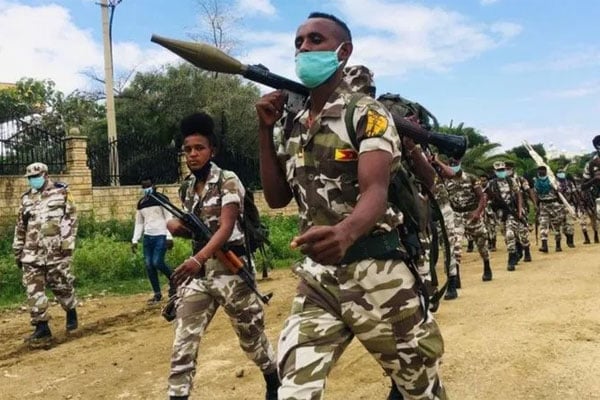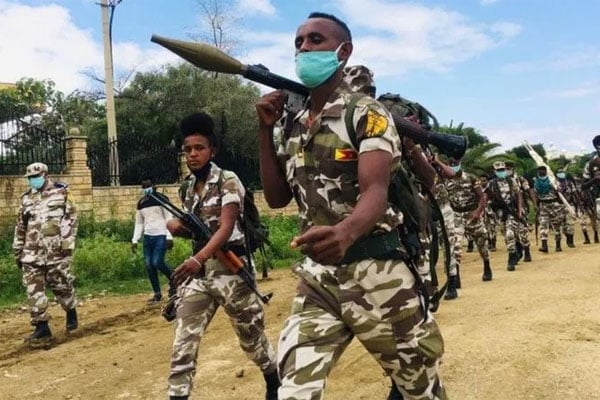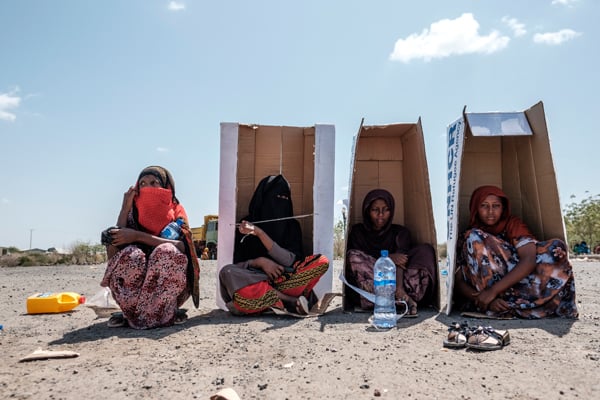Prime
US says Eritrean forces still on Ethiopian soil

Ambassador Linda Thomas-Greenfield, U.S. Representative to the United Nations, said Eritrean forces only moved back to the border but still remain in Ethiopia. Photo | AFP
What you need to know:
- Ambassador Linda Thomas-Greenfield, U.S representative to the United Nations, said Eritrean forces only moved back to the border but still remain in Ethiopia.
A senior U.S. official said on Saturday that Eritrean troops have not yet withdrawn from Ethiopia unlike Ethiopian authorities claim that they have already left.
Ambassador Linda Thomas-Greenfield, U.S representative to the United Nations, said Eritrean forces only moved back to the border but still remain in Ethiopia.
Ambassador Thomas-Greenfield made the remarks at a news conference while visiting the Kenyan capital Nairobi.
"With respect to Eritreans we understand they have moved back to the border and they have been asked to leave," she told reporters.
Eritrean and Ethiopian officials haven't yet reacted to the diplomat's claim.
In recent days, locals on the ground confirm seeing convoys of Eritrean troops leaving towns in the war-torn region of Tigray but said they have to wait if that is happening for real.
Last month, witnesses and an Ethiopian official reported that Eritrean soldiers were leaving the Shire and two other major towns, but many ended up staying behind.
A senior Ethiopian military officer while briefing foreign officials on Saturday denied the presence of any Eritrean troops.
"There is no other security force in the Tigray region except the Federal Defense Forces," Major General Teshome Gemechu said.
A spokesperson for the Tigrayan forces, Getachew Reda, dismissed claims that the Eritrean troops had left Tigray and said "thousands" were still there.
Previously, the departure of Eritrean troops has been announced several times but remains unverified officially.
Eritrean troops fought alongside the Ethiopian military and allied militias in the two-year conflict in Tigray region.
In November, however, the Ethiopian government and the Tigray People's Liberation Front (TPLF) signed a peace agreement to end the hostilities,
That agreement mandated the withdrawal of all foreign and non-ENDF forces from Tigray.
The continued presence of Eritrean troops in Tigray, despite a November cease-fire deal, thus has been seen as a significant obstacle to the effective implementation of the peace pact and to eventually securing a lasting peace to the Ethiopian conflict.
The United States, along with the European Union, have been putting immense pressure on Eritrea to exit its troops.
US Secretary of State Antony Blinken in a recent telephone call with Ethiopian Prime Minister Abiy Ahmed said that the withdrawal of Eritrean troops was key to securing a sustainable peace in northern Ethiopia, and urged access for international human rights monitors.
The withdrawal has not yet been confirmed by the peace deal signatories or the agreement's observation mission.
Per the Pretoria agreement, disarmament of TPLF's heavy weapons would be done concurrently with the withdrawal of foreign and non-ENDF forces from the region.
Tigray Forces say they have already accomplished their part as they have begun handing over heavy weapons.
Lack of commitment to withdraw Eritrean troops will make the already fragile peace deal more at risk, says William Davison, Senior analyst for Ethiopia at the International Crisis Group (ICG).
"If Eritrea does not withdraw its forces, then Ethiopia's government will have to ensure that occurs," William told The East African.
"Should Eritrean forces not leave, then Tigray's leaders may well not comply with key parts of the agreement, increasing the risks of a catastrophic return to war" he added.
The Tigray war, which began in November 2020, has claimed the lives of over 600,000 people and forced millions to flee their homes.




